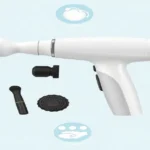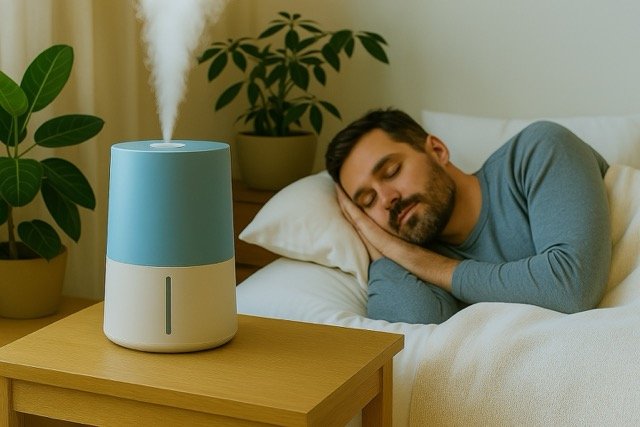
Massagers: Essential Devices for Better Wellbeing
February 16, 2026
Ergonomic Office Chairs for Workplace Wellbeing
February 16, 2026
Air quality affects every part of our lives, yet many people overlook it. From allergies to asthma, poor indoor air can lead to serious health issues. An air purifier can be a simple, effective solution to combat these problems and provide cleaner air for you and your family.
What Does an Air Purifier Do?

An air purifier works to cleanse and improve indoor air quality by removing contaminants from the air. These devices use a combination of filters, such as HEPA filters, activated carbon, and sometimes ionizers, to capture and eliminate airborne particles like dust, pollen, pet dander, smoke, and even bacteria and viruses.
By continuously filtering the air in a room, air purifiers help reduce allergens and pollutants, making the environment healthier and more comfortable to breathe. As a result, they contribute to better overall wellbeing, especially for individuals with allergies, asthma, or respiratory conditions. 😊
How Do Air Purifiers Work?
Most air purifiers draw in the surrounding air, pass it through a series of filters, and then release the purified air back into the room. Depending on the technology, they can trap particles, neutralize odors, or even kill bacteria and viruses. It's like having a personal air guardian on duty 24/7.
Do Air Purifiers Work?
Yes, air purifiers do work effectively to improve indoor air quality. They are designed to remove various airborne contaminants, including dust, pollen, pet dander, mould spores, and even some bacteria and viruses. Most air purifiers use HEPA filters to capture up to 99.97% of particles as small as 0.3 microns. Some also incorporate activated carbon filters to eliminate odours and gases.
Studies, such as those published in the Journal of Allergy and Clinical Immunology, have shown that air purifiers can significantly reduce allergens and pollutants, leading to improved respiratory health and overall wellbeing for users, especially those with allergies or asthma. 😊
Types of Air Purifiers
When it comes to air purifiers, there's no one-size-fits-all. Let's break down the main types:
HEPA Filters
High-efficiency particulate Air (HEPA) filters are the gold standard. They capture 99.97% of particles as small as 0.3 microns. If allergies are your nemesis, a HEPA filter is your best ally.
Activated Carbon Filters
These filters are champs at absorbing odours and gases. Are you a smoker in the house or love cooking aromatic dishes? Activated carbon filters will keep your space smelling fresh.
UV Light Purifiers
Using ultraviolet light, these purifiers zap bacteria and viruses. It's like giving germs a one-way ticket out of your home.
Ionizers
Ionizers release charged ions that attach to airborne particles, causing them to settle out of the air. While effective, some ionizers can produce ozone, which has its own health concerns.
Ozone Generators
Speaking of ozone, these devices intentionally produce it to neutralize odours. However, ozone can be harmful in high concentrations, so they're not recommended for regular home use.
Best Air Purifiers in the Market
Benefits of Using Air Purifiers
Why should you consider adding an air purifier to your space? Here are some compelling reasons:
Allergy Relief: Air purifiers can help reduce sneezing, itching, and watery eyes by removing common allergens like pollen and pet dander. Say goodbye to those allergy meds!
Asthma Symptom Reduction: Cleaner air means fewer asthma triggers. Breathing becomes easier, and flare-ups are less frequent.
Elimination of Harmful Chemicals: From cleaning agents to paints, our homes can harbour volatile organic compounds (VOCs). Air purifiers help remove these unseen threats, making your environment safer.
Odour Removal: Whether it's last night's fish dinner or your furry friend's "aroma," air purifiers can neutralize unpleasant smells, keeping your home inviting.
Improved Sleep Quality: Breathing clean air can lead to better sleep. No more waking up congested or with a scratchy throat.
Factors to Consider When Choosing an Air Purifier
Ready to make a purchase? Keep these factors in mind:
Room Size: Ensure the purifier is suitable for your room's square footage. A unit too small won't be effective, while one too large might be overkill.
Filter Types: Depending on your needs—be it allergen removal, odour control, or germ elimination—choose a purifier with the appropriate filters.
Noise Level: Some purifiers can be noisy, especially at higher settings. If you're sensitive to sound, look for models known for quiet operation.
Maintenance and Operating Costs: Consider the cost and frequency of filter replacements. Some units might have a lower upfront cost but higher maintenance expenses over time.
Where to Place Air Purifier
To get the most out of your air purifier, place it in central areas where you spend the most time, like the living room or bedroom, to maximize its effectiveness.
Ensure the unit isn't blocked by furniture, walls, or other obstacles that could hinder proper air circulation, allowing it to draw in and expel air freely. Elevating the purifier, either by placing it on a table or a shelf, can enhance its ability to capture airborne particles more efficiently, especially in rooms with higher ceilings where pollutants might be more spread out.
By following these tips, you can optimize the performance of your air purifier and improve the air quality in your home, contributing to better overall wellbeing.
Summary: Air Purifier Take Away
air purifiers are essential tools for improving indoor air quality and overall wellbeing. By effectively removing contaminants, allergens, and pollutants, they help create a healthier and more comfortable living environment, especially for individuals with respiratory conditions. Utilizing the right type of air purifier and positioning it optimally can significantly enhance its effectiveness, providing cleaner air for you and your family.






